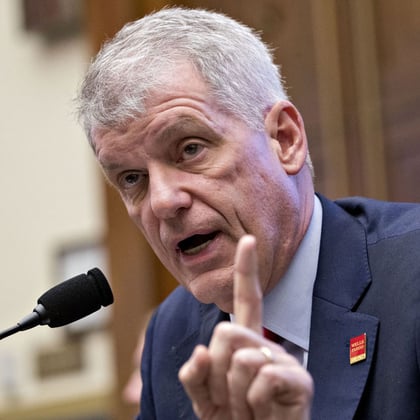Tim Sloan sued Wells Fargo & Co. for more than $34 million, saying the company illegally withheld years of unpaid compensation after he stepped down as chief executive officer in 2019.
Sloan is seeking to force Wells Fargo to honor multiple canceled stock awards and a bonus he says he was promised, according to a complaint filed Friday in California state court. He’s also seeking unspecified damages for, among other things, emotional distress.
The former CEO led Wells Fargo from October 2016 to March 2019, a period in which problems multiplied across business lines and the bank was hit with costly regulatory penalties, including a Federal Reserve-imposed cap on growth that has yet to be resolved.
Sloan claims in his suit that those problems predated his tenure, and that he worked to correct them as CEO. He said no one on the board blamed him until they became the subject of political and media criticism after his departure from the bank.
Wells Fargo is “depriving Mr. Sloan of tens of millions of dollars in deferred compensation he had earned during his career,” according to the complaint. “To this day, Wells Fargo has failed to identify anything Mr. Sloan did or failed to do that would justify its decision.”
While it’s not unusual for financial firms to face legal battles over deferred pay, it’s rare at the CEO level. When Wells Fargo announced Sloan’s exit, it described the move as “his decision” and said it reflected his “commitment” to the company, characterizations cited in Sloan’s complaint.
“Compensation decisions are based on performance, and we stand by our decisions in this matter,” a spokesperson for Wells Fargo said.
Sloan, 63, took over Wells Fargo weeks after a scandal involving fake customer accounts erupted at the firm. John Stumpf, his predecessor who had run the bank since 2007, stepped down amid intense scrutiny from Washington and beyond.
Reform Attempts
As president and chief operating officer, Sloan was Stumpf’s obvious replacement from inside the firm. He rose through the wholesale arm rather than the consumer division where employees had created millions of unauthorized accounts to meet sales goals.
After taking over, Sloan launched a series of reforms, saying in a 2018 Bloomberg interview: “You name it, we’ve changed it.”
But as an insider, he faced criticism from the start that he wasn’t the right person to fix the bank, despite being largely exonerated in a 2017 board investigation into the fake-accounts scandal. Those objections grew louder as problems multiplied and regulators became increasingly — and publicly — frustrated with the pace of the clean-up.








 December 04, 2023 at 01:03 PM
December 04, 2023 at 01:03 PM












 Copyright © 2024 ALM Global, LLC. All Rights Reserved.
Copyright © 2024 ALM Global, LLC. All Rights Reserved.